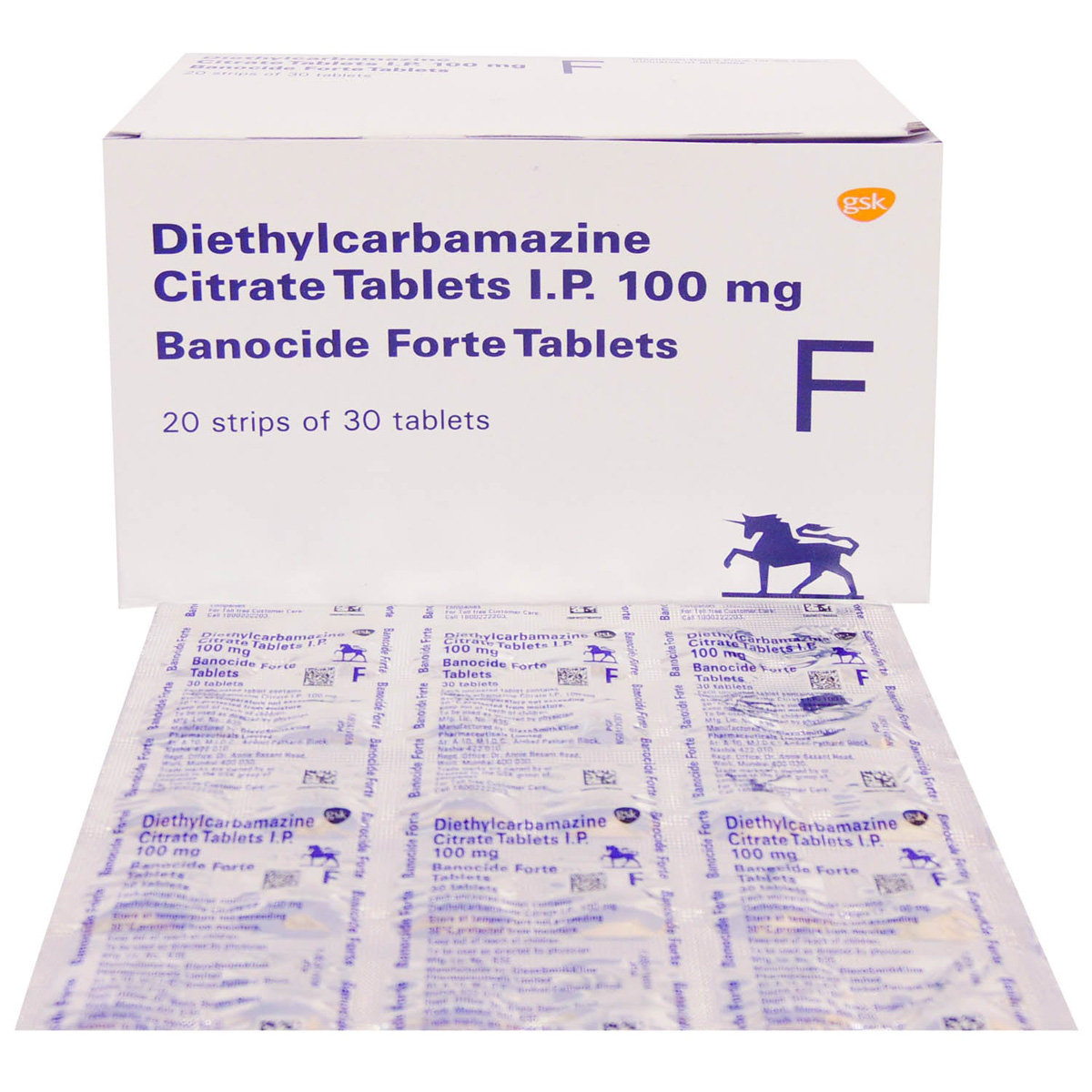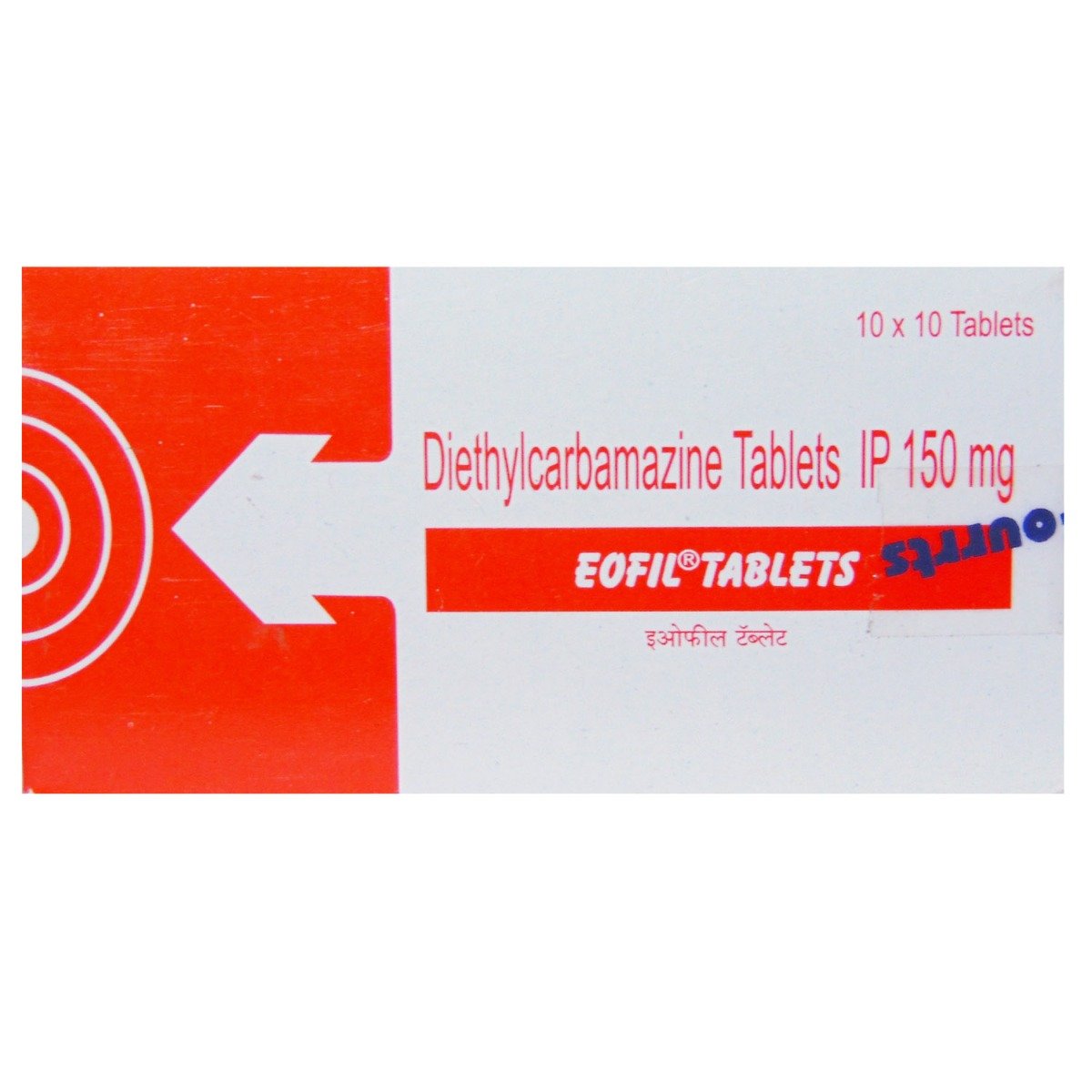Diethylcarbamazine
About Diethylcarbamazine
Diethylcarbamazine belongs to a group of medicines called 'anti-parasitic drugs/ anti-anthelmintics/ anti tapeworm drugs', primarily indicated for the treatment of certain parasitic infections including Bancroft's filariasis, Eosinophilic lung, Loiasis, and River blindness. Parasites are the living organisms that live inside another organism (the host) for their survival (e.g. by getting nutrients from the host's body. These parasites grow, reproduce, get important nutrients from a person's body and make them sick called 'parasitic infection. Common parasitic infections are River blindness, Loiasis, Eosinophilic lung, and Bancroft's filariasis.
Diethylcarbamazine consists of Diethylcarbamazine that helps to treat certain parasitic infections and symptoms associated with it. Diethylcarbamazine is an anti-parasitic drug that works by killing the worm.
Take this medicine as directed by the healthcare professional. Diethylcarbamazine may have common side effects like itching, swelling of the face, especially near the eyes, tightness in the chest or throat, wheezing, feeling sleepy, and nervousness. Contact your health care provider if these side effects bother you or do not resolve gradually.
It is significant that you need to visit your doctor regularly that will help the doctor check that the infection is clearing up. Likewise, the doctor may also suggest having an eye check-up. Diethylcarbamazine may cause dizziness, affects thinking ability and changes vision so make sure that you did not drive or do any work that needs a clear vision if any of the unpleasant effects of medicine become bothersome then call your doctor on an urgent basis. Diethylcarbamazine is allowed to use in pregnancy as it a category B drug that is not supposed to harm an unborn baby. This medicine can only be used in breastfeeding when strictly advised by the doctor as it has the ability to pass into breast milk.
Uses of Diethylcarbamazine
Medicinal Benefits
Diethylcarbamazine consists of 'Diethylcarbamazine' as its medicinal constituents and is used for the treatment of certain types of parasitic infections. Diethylcarbamazine is an anti-parasitic medication that works by killing worms circulating in the bloodstream. It is used to treat Bancroft's filariasis, Eosinophilic lung (tropical pulmonary eosinophilia, Loiasis, and River blindness (onchocerciasis).
Directions for Use
Storage
Side Effects of Diethylcarbamazine
- Itching
- Swelling of the face, especially near the eyes
- Tightness in the chest or throat
- Wheezing
- Feeling sleepy
- Nervousness
Drug Warnings
One should consult with their doctor before giving Diethylcarbamazine to the child as it may cause a serious reaction if used in very young children. The use of Diethylcarbamazine is not allowed in patients dealing with a blockage in your stomach or intestine, difficulty in urinating, enlarged prostate, an asthma attack. Diethylcarbamazine may cause night blindness or even loss of vision if used for a long time, so one should visit their doctor regularly and should avoid driving or doing any work that needs a clear vision. The doctor may recommend a corticosteroid medication in certain patients facing river blindness with severe symptoms. It is given to reduce the inflammation that happened during the death of worms. Take these medications exactly in the same manner as directed by your doctor.
Drug Interactions
Drug-Drug Interaction: The possible medications that can interact with Diethylcarbamazine include antihistamine drugs (fexofenadine, loratadine, diphenhydramine), analgesics (acetaminophen), and anti-allergic medicine (montelukast).
Drug-Food Interaction: Alcohol or tobacco can interact with Diethylcarbamazine so one should tell their healthcare professional if they are consuming such products.
Drug-Disease Interaction: Diethylcarbamazine cannot be used in conditions that include seizure, eye complications, severe kidney problems, narrow-angle glaucoma, a blockage in the stomach or intestines, an enlarged prostate, difficulty to urinate, an asthma attack.
Drug-Drug Interactions Checker List:
Safety Advice

Alcohol
cautionIf a person is already taking Diethylcarbamazine, then they should limit the consumption of alcohol as it may increase the side effects of the medicine.

Pregnancy
safe if prescribedDiethylcarbamazine is a category B drug that does not cause any harm to the unborn baby but this medicine can only be used in pregnancy if strongly suggested by the doctor.

Breast Feeding
cautionDiethylcarbamazine has the ability to pass into breast milk that can harm the unborn baby, so do not use this medicine without asking the doctor.

Driving
unsafeDiethylcarbamazine may cause blurred vision so one should avoid driving as it may increase the chances of accidents.

Liver
cautionPersons dealing with liver disease may be are at higher risk of getting side effects of Diethylcarbamazine. Treatment with Diethylcarbamazine should be administered cautiously in these patients. Initially, the doctor may suggest a lower dosages.

Kidney
cautionPersons dealing with kidney disease may be are at higher risk of getting side effects of Diethylcarbamazine. Treatment with Diethylcarbamazine should be administered cautiously in these patients. Initially, the doctor may suggest lower dosages.

Children
unsafeDiethylcarbamazine can only be used in children if strongly suggested by the doctor as misuse of medication may cause serious side effects in children.
Habit Forming
Diet & Lifestyle Advise
- It is best to consume a balanced diet, which is high in nutrients and very less in refined sugars/ processed foods.
- Fiber is important for the bowel movement which helps to cleanse parasites from the body so include more fiber-rich foods in the body like oats.
- Pumpkin seeds, garlic, honey, and papaya seeds are considered antiparasitic foods so it is best to include them in your diet.
- Sometimes doctors may recommend a grain-free, sugar-free diet while others may recommend limiting fruit intake in order to further reduce dietary sugars, so better talk to your nutritionist.
Special Advise
Certain diagnostic tests like Blood smear could help in detecting the type of parasite infection.
Patients Concern
Disease/Condition Glossary
Parasites are the living organisms that live inside other organism's bodies (hosts) for their survival. Some parasites do not cause any harm to their host while some cause sickness in the human body resulting in parasitic infection. Malaria is also a parasitic disease that affects many individuals. There are three types of organisms responsible for causing a parasitic infection that include protozoa (single-celled, and multiply inside the body), Helminths (multicelled, live outside the body like tapeworms), and Ectoparasites (multi-celled, live or feed off the skin like mites). Some common parasitic infection includes:
Bancroft's filariasis: It is caused by thread-like worms that live inside the lymphatic system of humans. The lymphatic system of the body consists of fluid and is responsible for fighting infections. This disease spreads from one person to person by mosquitoes. Common symptoms include fever, skin exfoliation. And high levels of eosinophils (white blood cells).
Loiasis: It is also called as 'African eye worm', which is an infectious parasitic disease that is transmitted to humans by the bite of Chrysops deerfly species. A person dealing with this disease may face itchy, non-painful swellings in their body. Sometimes, a person may see worms crawling under their skin or an eye worm.
River blindness: It is caused by a parasitic worm and is transmitted through repeated bites by black flies that live near the rivers and streams. If not treated, then it may even cause visual impairment and sometimes blindness.
Eosinophilic lung: This is a disease related to lung problems in which white blood cells in the body get increased. White blood cells are responsible for fighting allergic reactions and certain infections. Some of the symptoms of this disease include cough, chest pain, and tightness, increased mucus, rapid breathing, bloody mucus and shortness of breath.
FAQs
Diethylcarbamazine consists of Diethylcarbamazine (anti-parasitic medication). Diethylcarbamazine is responsible for killing worms present in the bloodstream, in this way it provides relief in parasitic infection.
It is advised to go for regular checkups to the doctor as it will help them to check the progress of medicine in clearing up the infection. Your doctor may also suggest you go for an eye check-up as some persons may experience temporary or permanent eye problems if used for a longer time, while taking this medicine, so consult with your doctor to avoid such side effects.
To clear out the infection completely from the body, your doctor may suggest full-time treatment, even if the symptoms got clear up in a few days. If you stop taking this medicine without completing the course then the parasitic infection will return, so complete your treatment course.
A person who is hypersensitive to any of component of Diethylcarbamazine or dealing with narrow-angle glaucoma, an enlarged prostate, blockage in your stomach or intestines, difficulty in urinating, or had an asthma attack. Tell your doctor about all of your medical conditions.
The doctor may suggest a corticosteroid medicine in some patients dealing with river blindness as this combination will help to reduce the inflammation in the body caused due to the death of the worms.
Diethylcarbamazine may pass into breast milk so one should strictly ask your doctor before taking it. This drug can only be used in breastfeeding women is suggested by a doctor.







